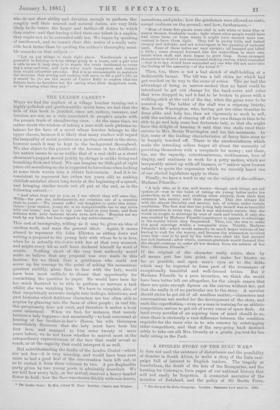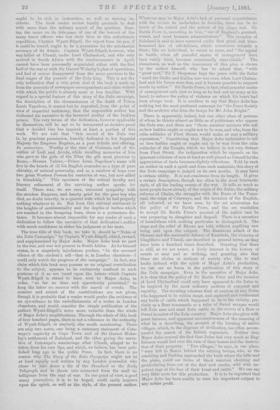A SPOILED STORY OF THE ZULU WAR.*
IT does not need the existence of disturbance and the possibility- of disaster in South Africa, to make a story of the Zulu cam- paign full of interest to English readers. The tragedy at Isandwlana, the death of the heir of the Bonapartes, and the hunting for Cetewayo, form pages of our national history that will not easily be forgotten. A connected narrative of the invasion of Zululand, and the policy of Sir Bartle Frere,.
• The Story of the Zulu Campaign. London : Sampson Low and Co. 1880..
ought to be rich in instructive, as well as moving in- cidents. The book under review hardly pretends to deal 'with more than the military aspect of the question. Bear- ing the name on its title-page of one of the bravest of the many brave officers who lost their lives in this unfortunate expedition, Captain Wyatt-Edgell, the report from his pen, if it could be traced, ought to be a guarantee for the substantial accuracy of its details, Captain Wyatt-Edgell, however, who was killed at Ulundi, under Lord Chelmsford, and who only arrived in South Africa with the reinforcements in April, cannot have been personally acquainted either with the first half of the war or with Sir Garnet Wolseley'e plan of operations and had of course disappeared from the scene previous to the nal stages of the pursuit of the Zulu. king. This is not the only indication that a very great deal of the book is made up from the accounts of newspaper correspondents and other writers with which the public is already more or less familiar. With regard to a special feature of this story of the Zulu campaign, the description of the circumstances of the death of Prince Louis Napoleon, it cannot but be regretted, from the point of view of impartial testimony, that the responsible author has dedicated his narrative to the bereaved mother of the luckless prince. The very terms of the dedication, however applicable in themselves, will be apt to be interpreted as decisive proof that a decided bias has inspired at least a portion of this work. We are told. that "this record of the Zuln war is, by gracious permission, humbly dedicated to her Imperial Majesty the Empress Eughie, as a poor tribute and offering. In memoriam. Worthy of the race of Guzman, and of the soldier of Lodi and Arcola, while recalling memories of him who gave to the gods of the Tiber the gift most precious to Rome,—Human Valour,--Prince Louis Napoleon's name will live in the hearts of ll his English comrades as a type of pure chivalry, of natural generosity, and as a rainbow of hope over two great Western Powers for centuries at war, but now allied in friendship." This specimen of the critical faculty and literary refinement of the surviving author speaks for itself. There was, we are sure, universal sympathy with the stricken Empress, and hearty grief for the poor boy who died, no doubt bravely, in a quarrel with, which he had properly nothing whatever to do. But from this rational sentiment to the heights of sentimentality and the depths of bathos which are reached in the foregoing lines, there is a portentous dis- tance. It becomes almost impossible for any reader of such a dedication to follow the narrative of that dedication's author with much confidence in either his judgment or his taste.
The true title of this book, we take it, should be "Notes of -the Zulu Campaign," by Captain Wyatt-Edgell, edited, revised, and supplemented by Major Ashe, Major Ashe took no part in the war, and was not present in South Africa. As he himself states, in a singularly injudicious preface, "In the unvexed silence of the student's cell—that is, in London chambers—I could only watch the progress of the campaign." In fact, any claim which this book may possess as an original contribution to the subject, appears to be exclusively confined to such portions of it as are based upon the letters which Captain Wyatt-Edgell is stated to have sent to Major Ashe, in -order, "as far as time and opportunity permitted," to keep the latter an courant with the march of events. The number and extent of the contributions are not given, though it is probable that a reader would prefer the evidence of an eye-witness to the embellishments of a writer in London chambers, and would. consider the simple publication of the gallant Wyatt-Edgell's notes more valuable than the whole of Major Ashe's amplifications. Through the whole of this book of four hundred pages, there is not a reference to the authority Wyatt-Eclgell, or anybody else worth mentioning. There are only two notes, one being a summary statement of Cote- swayo's captivity at Cape Town and. of Sir Garnet Wolso- ley's settlement of Zululand, and the other giving the narra- tive of Cetewayo's wanderings after Ulundi, alleged to be taken from his own lips, and which, we believe, has been pub- lished. long ago in the public Press. In fact, there is no reason why The Story of the Zulu, Campaign might not be at least equally well written by any London journalist who chose to take down a file of the Standard or the Daily Telegraph, and to throw into connected form the mail in- telligence from the seat of .war. In one point of view, a good many journalists, it is to be hoped, could easily improve upon the spirit, as well as the style, of the present author. Whatever may be Major Ashes lack of personal acquaintance with the events he undertakes to describe, there can be no doubt of the extent and the ardour of his Jingo zeal. Sir Bartle From is, according to him, " one of England's greatest, wisest, and Most humane administrators." The invasion of Zululand is said to have occurred under that great and time- honoured. law of self-defence, which sometimes compels a State, like an individual, to resort to arms, and " the appeal to battle, when all peaceful means of arrangement have been vainly tried, becomes occasionally unavoidable." The clumsiness, as well as the inaccuracy of this plea, is shown by the author himself, who has to admit that, "with "great tact," Sir T. Shepstone kept the peace with the Zulus " until the Gaika and Galika war was over, when Lord Chelms- ford and his forces were free, and it became possible to support words by action." Sir Bartle From in fact, tried peaceful modes of arrangement only just so long as he had not an army at his hand, to enforce the policy of violence on which his heart had been always bent. It is needless to say that Major Ashe has nothing but the most profound contempt for "the Peace Society and the acolytes who trim the lamps for Mr. John Bright."
There is apparently, indeed, but one other class of persons of whom he thinks almost as little as of politicians who oppose the Zulu war, and these are "those amateur mentors who tell us how battles ought or ought not to be won, and who, from the calm solitudes of Fleet Street, would make or mar a military reputation." Considering that Major Ashe undertakes to tell us how battles ought or ought not to be won from the calm solitudes of the Temple, which we believe is not very distant from Fleet Street, the indignation which he expends on the ignorant criticism of men at least as well placed as himself forthe appreciation of facts becomes slightly ridiculous. Told by such an author in such a spirit and from such materials, this story of the Zulu campaign is judged. on its own merits. It may have a certain utility. It is not cumbrous from its length. It gives a certain description, though too often in the most bombastic style, of all the leading events of the war. It tells as much as most people know already of the origin of the Zulus, the military reforms of Chaka, the struggles with the Boers of the Trans- veal, the reign of Cetewayo, and the invasion of the English, all coloured, as we have seen, by the set admiration for the policy of Sir Bartle Frere, and the set resolution to accept Sir Bartle Frere's account of the native race he was preparing to slaughter and despoil. There is a narrative of Isandwlana with nothing particular to distinguish it. The siege and the relief of Ekowe are told, without anything new being said upon the subject. The disastrous attack of the Slobani and the successful defence of Kambula, the victories of Gingilhovo and Ulundi, are described in general terms, as they have been a hundred times described. Granting that there is still, as we are aware, a lively interest in the history of events so near and so striking, and. granting also that there are circles or sections of society who like to read books imbued with the spirit of Major Ashe's production, we can- see no harm in the publication of this story of the Zulu campaign. • Even in the narrative of Major Ashe, it is clear that the policy of Sir Bartle Frere and the invasion of Lord Chelmsford could only have appeared to the Zulus to be inspired by the most ordinary motives of conquest and cupidity. The invading columns fired at random at any Zulus who happened. to be within range, and, captured and. confiscated
any herds of cattle which happened. to be in the vicinity, pre- cisely as a Boer commando or a tribe of Swazi sayages would kill Zulu men and steal Zulu cattle in the course of a Boor or Swazi invasion of the Zulu country. Major Ash() also gives with great fairness, and apparent unconsciousness of the meaning of what he is describing, the account of the burning of native villages, which, to the disgrace of civilisation, too often accom- panied. the march of the British regiments. Neither does Major Ashe conceal the fact that Zulus feel very much as Eng- lishmen would feel over the ruin of their homes and the destruc- tion of their property. "Two villages," he says, in one place, " were left in flames behind the retiring troops, who, as the crackling and flashing approached the bush where the hills met the plain, could. see forms of black warriors shouting and gesticulating from out of the dust and smoke, wild With im- potent rage at the loss of their kraal and. cattle." We can say very little more for this production. It is to be regretted that Major Ashe has been unable to turn his important subject to any nobler profit.















































 Previous page
Previous page